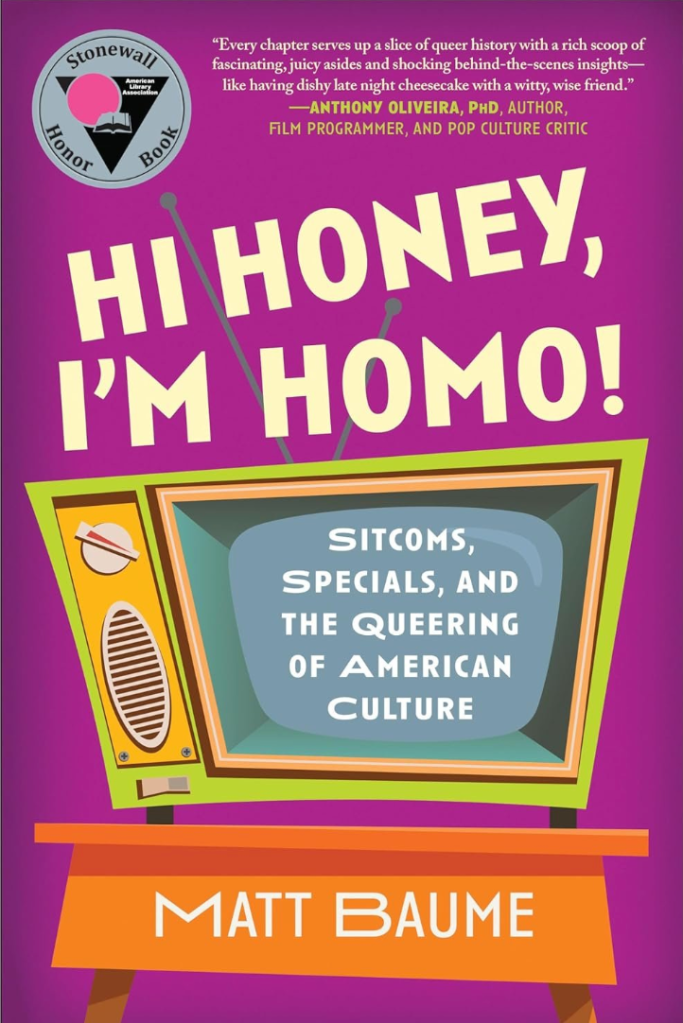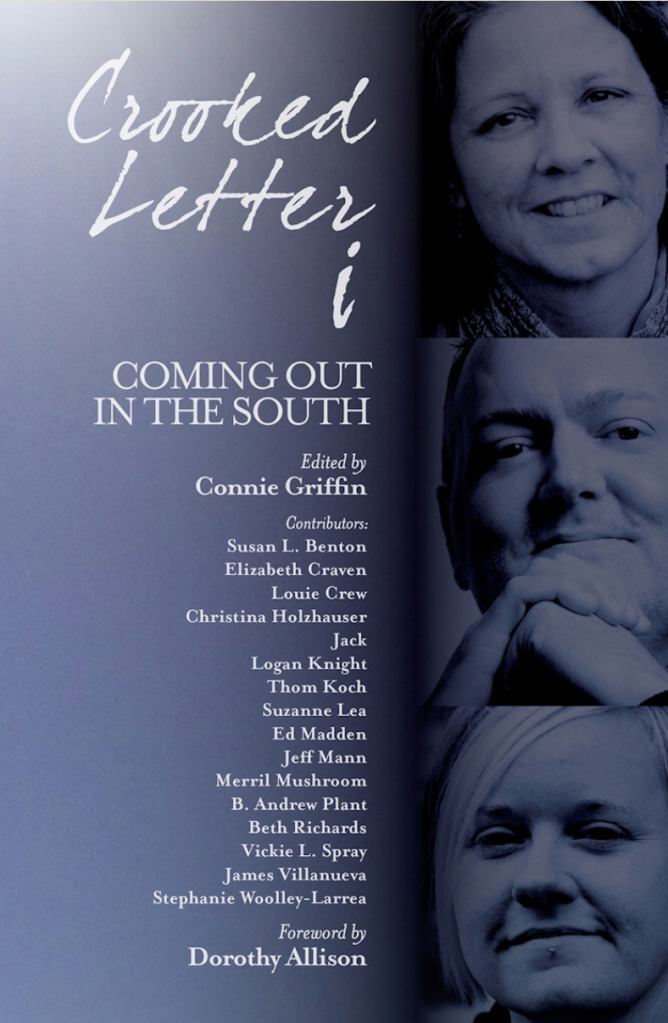I’ve mentioned earlier this month how I’m not Mr. Nonfiction, and how apart from biographies, I don’t often end up delving a lot into nonfiction, and usually only do when I’ve got audio options available. That said, I do try to pick up queer history at least now and then, given I was raised in the same queer-erasing culture as everyone else in my immediate vicinity.
I also try to find people who can focus down onto one specific slice at a time. I don’t know why I prefer reading about history or biography this way, but I always prefer a kind of narrow specificity. If a book tells me it’s going to talk about one broad topic, I often find myself struggling to generate interest. But if a book narrows this down to some piece of the whole?
I’m so much more likely to be on board.
So, let’s talk about two pieces of history today on my journey through Pride Month recommendations: sitcoms, and growing up queer in the Southern US—both of which were far, far out of my own wheelhouse.
Queer History in Glimpses
I bumped into Matt Baume via a random encounter with a YouTube video about the film Victim. That led me down a rabbit-hole of his videos and then I learned about Hi Honey, I’m Homo!: Sitcoms, Specials, and the Queering of American Culture and I was off and running. I decided to read a chapter every day or so, since the book is broken up by particular sitcoms, starting with Bewitched and heading closer to modernity with every entry—I mean that literally, given we get to Modern Family eventually.
What was fascinating for me was the ebb-and-flow, which parallels my experiences over the decades as an out queer person (and oh my God, I’m at the point in my life where I can say “decades as an out queer person”): the pattern of “forward-backward, progress-pushback, representation-villification” can be just as exhausting when you look at only one facet of it—such as this book does, by focusing on sitcoms—as when you live it as a whole.
Also? almost every piece of representation discussed in the book could be summed up with “It was progress—if you know the context.”
But the context is worth knowing.
There’s a secret storyline hidden across some of the most popular sitcoms of the 20th century.
For decades, amidst the bright lights, studio-audience laughs, and absurdly large apartment sets, the real-life story of American LGBTQ+ liberation unfolded in plain sight in front of millions of viewers, most of whom were laughing too hard to mind.
From flamboyant relatives on Bewitched to network-censor fights over Barney Miller, from military secrets on M*A*S*H to a little-known man behind The Muppet Show to a primetime power-kiss on Roseanne, TV, Hi Honey, I’m Homo! is not only the story of how subversive queer comedy transformed the American sitcom, from its inception through today, but how our favorite sitcoms transformed, and continue to transform, America.
Accessible, entertaining, and informative, the book is filled with exclusive commentary and interviews from celebrities, behind-the-scenes creators, and more.
My other preferred format for reading about history does a similar “focus down narrowly” thing, only instead does so by bringing me multiple voices exploring the same topic. This was my experience reading Crooked Letter i: Coming Out in the South, which I’ll admit only crossed my path because I’d gone to Saints and Sinners Literary Festival and met a few of the contributing authors.
As a Canuck, it’s safe to say I was surprised by this collection. Some of it was less startling: I imagined going in that I would be reading a lot about how religion has shaped the experiences of these queer people, but what I had not expected was to be shown a few times how religion was a caring and loving start (and sometimes even continued to be so). For many of those writing these essays, faith formed a solid foundation. Often they parted ways, and I don’t want to downplay the very real damage many suffered at the hand of their religious families or communities, but it wasn’t the total acrimony I expected.
The personal essays also touch upon living under the shadow of potential homophobia (how every slight makes you second-guess yourself for the cause), family acceptances, Sororities, AIDS, racism, gender, McCarthyism and integration, motherhood, the evolution of our language and self-descriptors… The 50’s, the 60’s, the 70’s and beyond are explored; There’s a wide range of personal experiences here, and I was enthralled.
In most LGBT writings I’ve read that touch the subject, I’ve seen The South described as a place survived, or as a place escaped from, but rarely have I seen it given any due as a positive experience by LGBT folk—at least, that’s been my experience. Reading this book, however, I found a series of new voices I’d never heard before. Ultimately, I think what I took from Crooked Letter i was how The South itself was such a source of strength and comfort for so many LGBT people—even for those who did choose to leave, but especially for those who remain or who came back.
Crooked Letter i offers a collection of first-person nonfiction narratives that reflect the distinct ‘coming out’ experiences of a complex cross-section of gay, lesbian, and transgendered Southerners from all walks of life and at different stages in their lives.
There is the Appalachian widower who, following the death of his wife, decides it’s time to tell his church community. There is the young man who left his hometown as a girl, returning hesitant but hopeful for his grandmother’s love. There is the adolescent girl who refuses to surrender her soul to Jesus because she is not yet certain of her own beliefs. There is the well-mannered Southern gentleman who hopes his blueberries and biscuits will help ease the awkwardness of coming out to his elderly neighbor. There are the ones who survived the frequent bar raids, arrests, and beatings. But, there is also the first kiss, and the first love.
The experiences represented here pivot around a central theme—finally finding language to understand one’s identity, and then discovering we were never the only ones. Revealing a vibrant cross-section of Southerners, the writers of these narratives have in common the experience of being Southern and different, but determined against all odds.
What are your favourite glimpses into queer history you’ve read?


I’m also not a huge nonfiction person, but some of the books that helped me frame how I understand queer America are:
Bonus points: two amazing documentaries about queer history, No Straight Lines, and The Lavender Scare.
LikeLiked by 1 person
I backed/kickstarted No Straight Lines! So good. 🙂 Adding all the rest to my list…
LikeLiked by 1 person
OMG, that’s amaze! Love that 💖
LikeLike